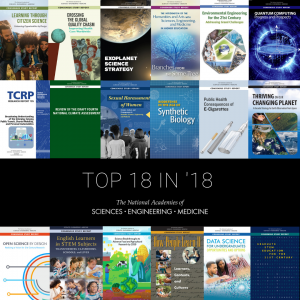In 2018, the National Academies of Sciences, Engineering, and Medicine continued to provide expert advice on some of the most pressing challenges facing the nation and the world. This list of the most downloaded titles published last year reflects the breadth of the National Academies’ work. As always, they are free to download.
How People Learn II: Learners, Contexts, and Cultures
There are many reasons to be curious about the way people learn, and the past several decades have seen an explosion of research that has important implications for individual learning, schooling, workforce training, and policy.
In 2000, …
Over the last few decades, research, activity, and funding has been devoted to improving the recruitment, retention, and advancement of women in the fields of science, engineering, and medicine. In recent years the diversity of those …
Public Health Consequences of E-Cigarettes
Millions of Americans use e-cigarettes. Despite their popularity, little is known about their health effects. Some suggest that e-cigarettes likely confer lower risk compared to combustible tobacco cigarettes, because they do not expose users to …
Graduate STEM Education for the 21st Century
The U.S. system of graduate education in science, technology, engineering, and mathematics (STEM) has served the nation and its science and engineering enterprise extremely well. Over the course of their education, graduate students become …
In the United States, broad study in an array of different disciplines —arts, humanities, science, mathematics, engineering— as well as an in-depth study within a special area of interest, have been defining characteristics of a higher …
Thriving on Our Changing Planet: A Decadal Strategy for Earth Observation from Space
We live on a dynamic Earth shaped by both natural processes and the impacts of humans on their environment. It is in our collective interest to observe and understand our planet, and to predict future behavior to the extent possible, in order to …
Data Science for Undergraduates: Opportunities and Options
Data science is emerging as a field that is revolutionizing science and industries alike. Work across nearly all domains is becoming more data driven, affecting both the jobs that are available and the skills that are required. As more data and …
Open Science by Design: Realizing a Vision for 21st Century Research
Openness and sharing of information are fundamental to the progress of science and to the effective functioning of the research enterprise. The advent of scientific journals in the 17th century helped power the Scientific Revolution by allowing …
Biodefense in the Age of Synthetic Biology
Scientific advances over the past several decades have accelerated the ability to engineer existing organisms and to potentially create novel ones not found in nature. Synthetic biology, which collectively refers to concepts, approaches, and …
Science Breakthroughs to Advance Food and Agricultural Research by 2030
For nearly a century, scientific advances have fueled progress in U.S. agriculture to enable American producers to deliver safe and abundant food domestically and provide a trade surplus in bulk and high-value agricultural commodities and foods. …
TRB’s Transit Cooperative Research Program (TCRP) Research Report 195: Broadening Understanding of the Interplay Among Public Transit, Shared Mobility, and Personal Automobiles explores the effects of app-based transportation network companies on …
Review of the Draft Fourth National Climate Assessment
Climate change poses many challenges that affect society and the natural world. With these challenges, however, come opportunities to respond. By taking steps to adapt to and mitigate climate change, the risks to society and the impacts of …
Quantum Computing: Progress and Prospects
Quantum mechanics, the subfield of physics that describes the behavior of very small (quantum) particles, provides the basis for a new paradigm of computing. First proposed in the 1980s as a way to improve computational modeling of quantum …
English Learners in STEM Subjects: Transforming Classrooms, Schools, and Lives
The imperative that all students, including English learners (ELs), achieve high academic standards and have opportunities to participate in science, technology, engineering, and mathematics (STEM) learning has become even more urgent and complex …
Crossing the Global Quality Chasm: Improving Health Care Worldwide
In 2015, building on the advances of the Millennium Development Goals, the United Nations adopted Sustainable Development Goals that include an explicit commitment to achieve universal health coverage by 2030. However, enormous gaps remain …
The past decade has delivered remarkable discoveries in the study of exoplanets. Hand-in-hand with these advances, a theoretical understanding of the myriad of processes that dictate the formation and evolution of planets has matured, spurred on …
Learning Through Citizen Science: Enhancing Opportunities by Design
In the last twenty years, citizen science has blossomed as a way to engage a broad range of individuals in doing science. Citizen science projects focus on, but are not limited to, nonscientists participating in the processes of scientific …
Environmental Engineering for the 21st Century: Addressing Grand Challenges
Environmental engineers support the well-being of people and the planet in areas where the two intersect. Over the decades the field has improved countless lives through innovative systems for delivering water, treating waste, and preventing and …



























































































